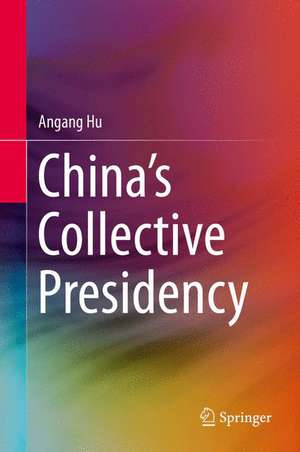China’s Collective Presidency
Autor Angang Huen Limba Engleză Hardback – 11 iul 2014
| Toate formatele și edițiile | Preț | Express |
|---|---|---|
| Paperback (1) | 380.63 lei 6-8 săpt. | |
| Springer Berlin, Heidelberg – 17 sep 2016 | 380.63 lei 6-8 săpt. | |
| Hardback (1) | 387.75 lei 6-8 săpt. | |
| Springer Berlin, Heidelberg – 11 iul 2014 | 387.75 lei 6-8 săpt. |
Preț: 387.75 lei
Nou
Puncte Express: 582
Preț estimativ în valută:
74.20€ • 77.66$ • 61.75£
74.20€ • 77.66$ • 61.75£
Carte tipărită la comandă
Livrare economică 31 martie-14 aprilie
Preluare comenzi: 021 569.72.76
Specificații
ISBN-13: 9783642552786
ISBN-10: 3642552781
Pagini: 164
Ilustrații: VI, 157 p.
Dimensiuni: 155 x 235 x 17 mm
Greutate: 0.41 kg
Ediția:2014
Editura: Springer Berlin, Heidelberg
Colecția Springer
Locul publicării:Berlin, Heidelberg, Germany
ISBN-10: 3642552781
Pagini: 164
Ilustrații: VI, 157 p.
Dimensiuni: 155 x 235 x 17 mm
Greutate: 0.41 kg
Ediția:2014
Editura: Springer Berlin, Heidelberg
Colecția Springer
Locul publicării:Berlin, Heidelberg, Germany
Public țintă
ResearchCuprins
Introduction - Key to the Success of China’s Political System.- The Historical Development of the Collective Presidency in China.- Collective Division of Work and Cooperation.- The Collective Handover Procedure.- Collective Learning.- Collective Research.- Collective Decision Making.- Political Advantages of the Collective Presidency.- Postscript.
Textul de pe ultima copertă
This book examines the historical development of China’s collective presidency and identifies five key mechanisms which effectively reduce the asymmetries of knowledge and power. The mechanisms discussed are: group or collective succession, collective division of responsibilities and cooperation, collective learning, collective research, and collective decision making. This work presents many facts including historical details showing that the collective presidency of China is a unique and prodigious innovation of the Communist Party of China (CPC) and China’s socialist political system. We see how China’s political system stands in contrast to the presidential system that exists in the United States, which can be described as a system of personal responsibility of the president. The author identifies characteristics of the collective presidency and introduces a framework for analysis. Chapters then explore the phases of historical development in detail and examine fundamental features in terms of their historical development, operational characteristics and evaluation. The final chapter summarizes the political advantages of collective presidency, particularly international competitive advantages, and readers will discover that the route to success for modern China lies in collective presidency. This book will appeal to anyone who wishes to discover how China’s political system works, to explore its political institutions that operate in conjunction with the CPC and the Chinese state, or to discover how a collective presidency can work successfully.
Caracteristici
Examines the historical development of China's collective presidency Identifies and discusses five key mechanisms which effectively reduce the asymmetries of knowledge and power in China’s political system Summarizes the political advantages of collective presidency, particularly international competitive advantages Includes supplementary material: sn.pub/extras













